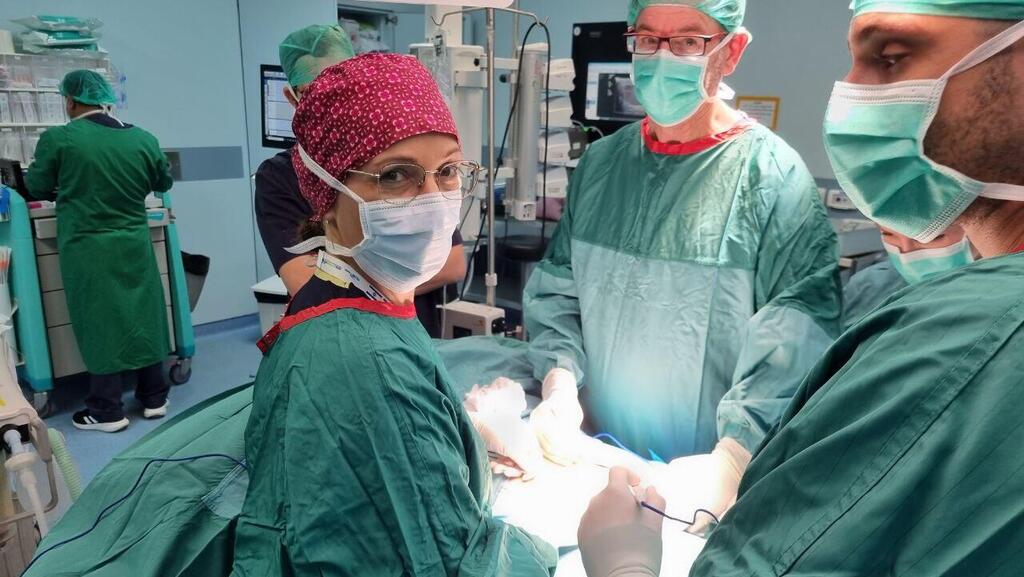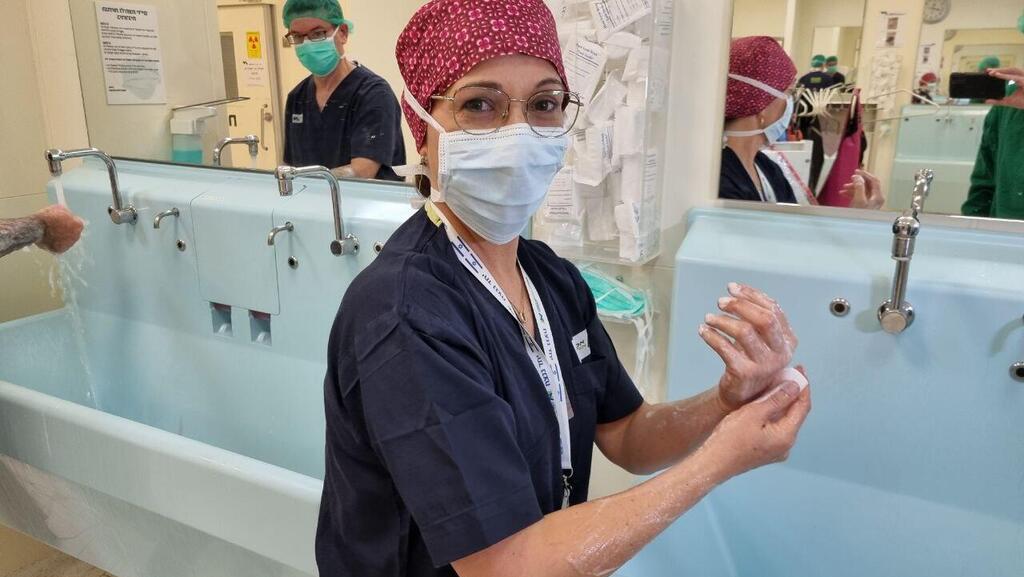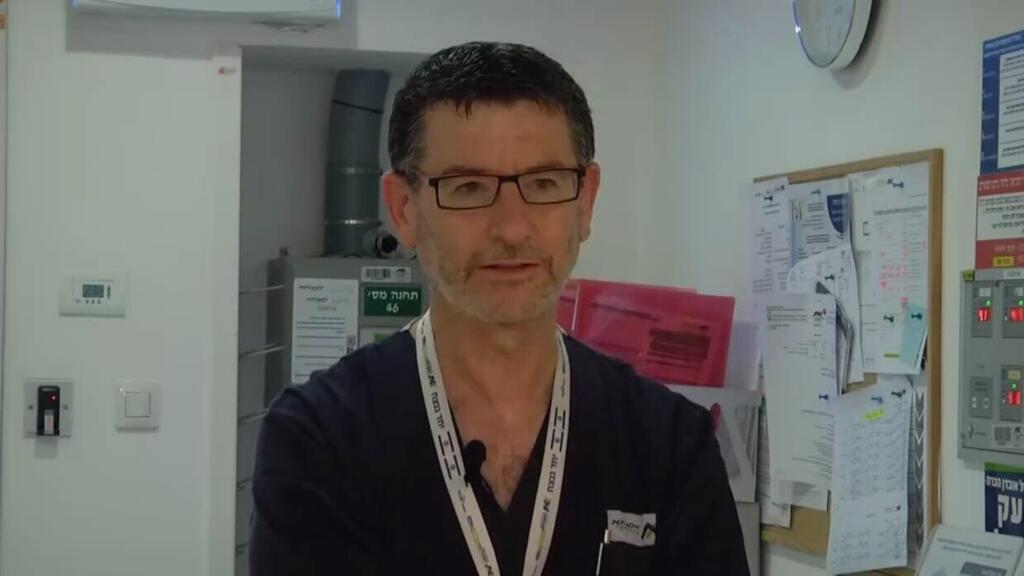Dr. Orit Raz, head of the urology department at Assuta Ashdod Hospital, explains how saving soldiers' genitalia has physical as well as psychological importance. Dr. Raz even preserves semen from fallen soldiers for the next generation, which has to be approved or requested by the family.
More stories:
At the end of a semen extraction, Dr. Raz said it was important for her to see the injury to understand the cause of death. "On the other side of the body, there were severe injuries. It was comforting for me to know that the soldier died because of the injuries and not during the transfer and medical treatment. When you enter a morgue to extract semen from a fallen soldier in Gaza, it is very very difficult, but I understand the widow and draw strength from her to do it."
On October 7, the urology department was mainly on leave for the holiday. "I was actually at home," Dr. Raz recalls. "In the morning hours, the wounded began to arrive for triage, and all the chaos began. Normally, the urological team is not part of the hospital's patient intake process, but due to the heavy workload, our department also volunteered to assist under the leadership of Dr. Amir Cooper, who was appointed to us."
Dozens of severely wounded arrived at the hospital's trauma department, and after stabilizing their condition, they were transferred for treatment by medical specialists according to the type of injury. "In the urology department, we began to receive victims with severe pelvic injuries, gunshot wounds, and shrapnel injuries that included damage to the urinary system, including the kidneys, tears in the bladder, and many injuries in the external genital area and the penis. We had a wounded soldier who underwent an amputation of a leg and a severe pelvic injury. In treatment, we had to perform surgeries in the genital area, including semen extraction for fear of loss of function of both testicles."
Semen extraction is an emergency medical procedure, taking sperm for the preservation of a wounded or deceased person. It is an extraordinary medical procedure that requires family approval. Semen extraction can be performed within a short time frame of a few days after death.
Dr. Raz explains the difference between semen preservation, a routine procedure, and emergency extraction. "Semen preservation and freezing are usually done from living individuals. Patients who need surgery or have tumors and receive treatments - to preserve sperm for the future. In injuries, when you don't know if the injury will cause the loss of testicles, there is the option to freeze sperm for preservation purposes - that's the extraction. In war, the situation is different because these patients mostly come to us unconscious and intubated and cannot request sperm preservation, so in many cases, the family initiates the request."
The senior urologist tells about a patient who underwent a difficult life-saving surgery following a pelvic injury and leg amputation. "During the recovery process, we identified a severe injury to one testicle and the hematoma (internal bleeding) inside the other testicle. We realized that there was a chance that the remaining testicle would lose its function. I came out of the surgery and spoke with the family, there are legal issues here and the signing of forms with the partner and parents. At a given moment, a decision must be made, and it was clear that it was for the benefit of the wounded soldier, so we made the decision and did it with legal advice, and indeed, time has shown that it was good that we did it." She adds emotionally: "These brave soldiers need a next generation."
"We both burst into tears"
During the fighting in Gaza, many casualties were also affected in the genital area, making the war routine of the urology department complex. "Working in the operating room is very technical. You encounter a problem and you need to solve it. The complex part is dealing with the families. It happened that I repaired a urinary tube for a soldier whose family I didn't know. After the repair, I went to the family, stood in front of the mother, and we both started crying overwhelmed by emotions. Sometimes you can be very emotional in certain situations, but medical professionals know how to make that separation, that detachment."
A constant story I hear from various medical teams in the recovery rooms after surgery is injured soldiers' concern for their virility, sometimes before the state of their limbs. Dr. Raz knows the situation well: "Usually when a wounded person wakes up from surgery, the first thing they check is their genitalia, not whether they lost a hand or a leg. It really surprised me. In the last four months, when patients with burns all over their bodies, amputees, and gunshot victims woke up, the first thing they asked was if everything was okay there. It's a very significant psychological element. It's very difficult for them to recover from it, and it's understandable. They're at the peak age of masculinity."
"The testicles have a dual role, to produce sperm for fertility and also to produce testosterone, the hormone responsible for masculinity, the low voice, body and facial hair, and muscles. Fortunately, for those who lost both testicles, today there are injections and patches that can serve as substitutes," says Dr. Raz.
Dr. Amir Cooper, head of the Andrology Unit, who headed the urology department at the Asuta Ashdod public hospital on October 7th and also treated severely injured patients, joins the conversation: "I think we can improve protection for soldiers in the genital area. There are already such protections in the world and I don't know why it's not implemented in Israel. If you dig a little on Google, you'll see pictures of such devices in the USA and also in Ukraine. I think in Israel too, it's worth trying to add protection to the genital area and see if it doesn't hinder the soldiers' mobility."
Dr. Cooper, you're a urology specialist and suddenly on October 7th, you find yourself in a general sorting room treating amputees?
"In my military service, I was a trauma physician. I participated in the First Lebanon War, so this situation is not unfamiliar to me, but it brought me back to the war. I had friends who were injured and lost a hand or a leg, and the first thing they checked was if the testicles were intact."
In addition to all the professional and emotional pressure of managing a urology department during wartime in a hospital, Dr. Raz also deals discreetly and simultaneously with much concern for her beloved combat soldier son who has been fighting in Gaza for over four months. "From my office window, you can see the landing pad for helicopters. Once, I finished a major urological surgery and heard about new injuries that arrived. I approached the officer in charge of the injured to know from which battalion they were. She knows me but didn't answer. I understood it was my son's battalion and hurried to the operating room. There were severe injuries there, and it was hard to identify the faces, those were very tough moments for me. I had one moment where I couldn't recognize if it was my son or not, but very quickly I realized that my son is still fighting in Gaza and I'm treating his friends. It gave him comfort knowing that I'm here with his friends and helping them."
What is your message to the people of Israel?
"I wish we could rebuild ourselves and be worthy of this entire generation that fought and was hurt and is expected to need a long time for physical and mental recovery. I think the Israeli healthcare system needs revamping and priorities. There is a lot a lack of manpower, and it needs to be strengthened and addressed. We saw the difficulty during the COVID pandemic, we see it now during the war, it's something that must be taken into account."




